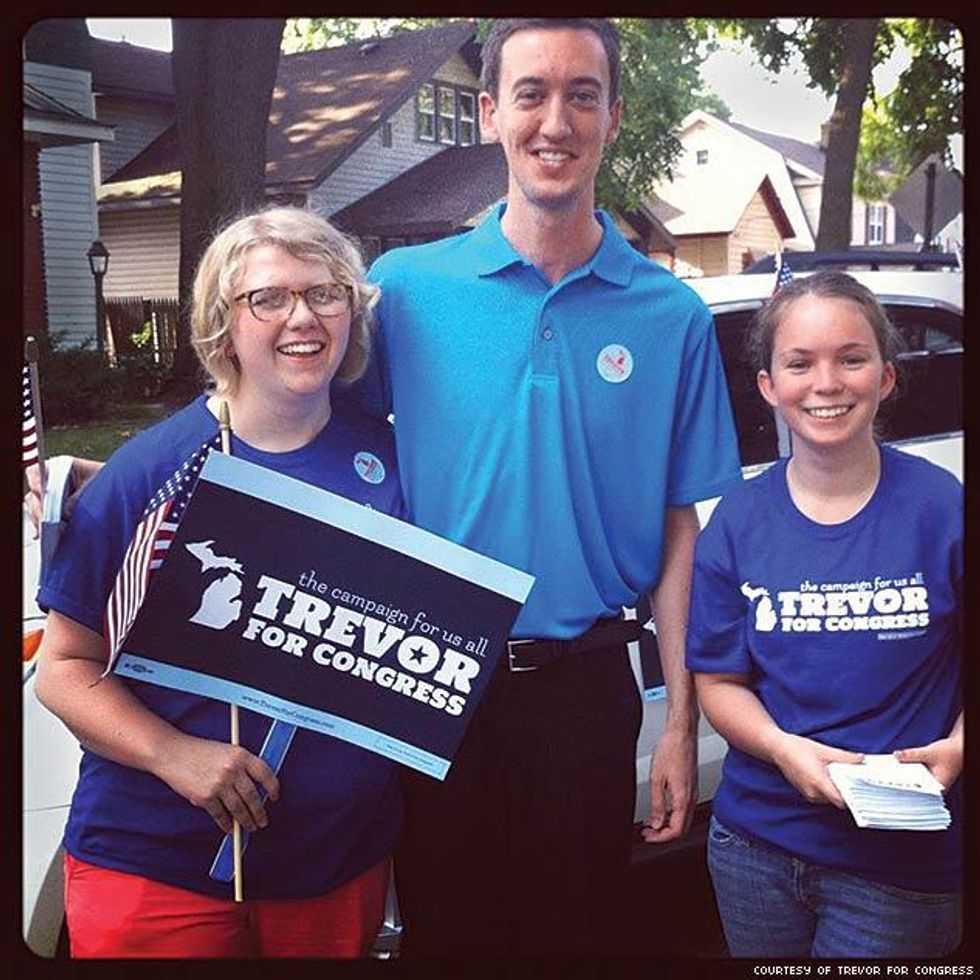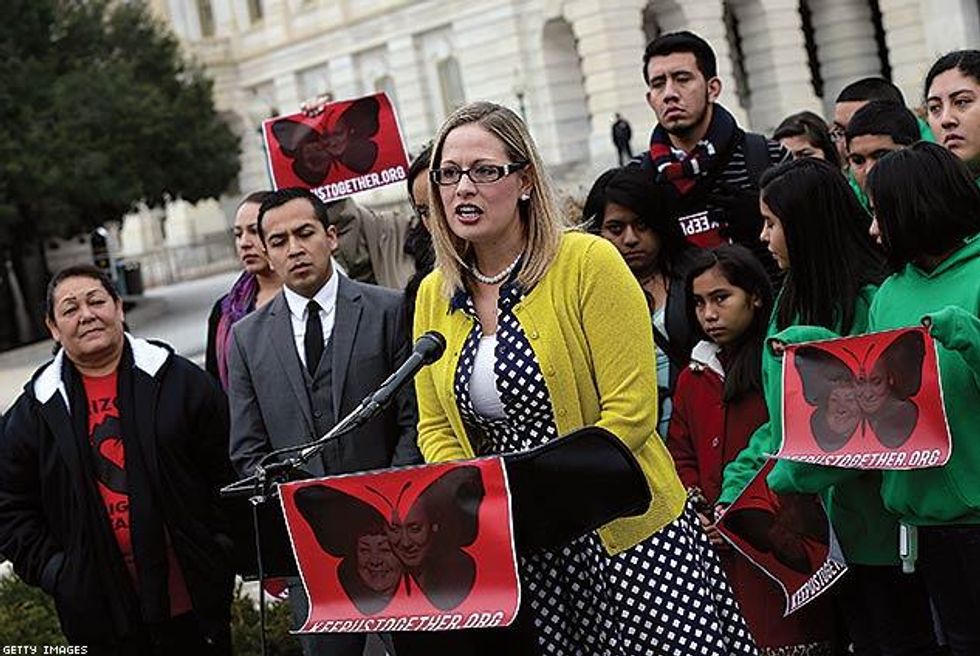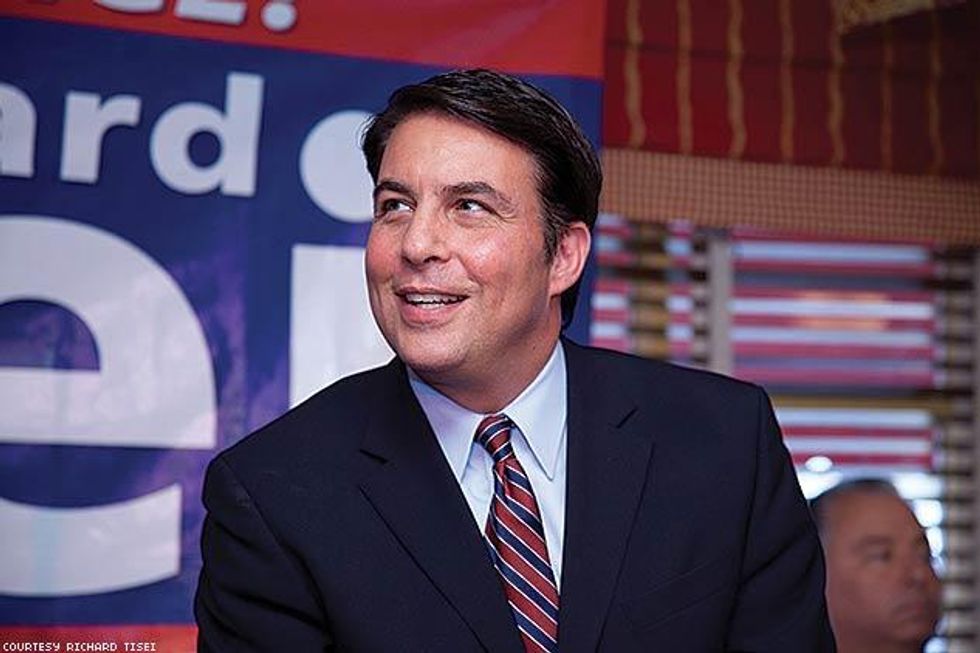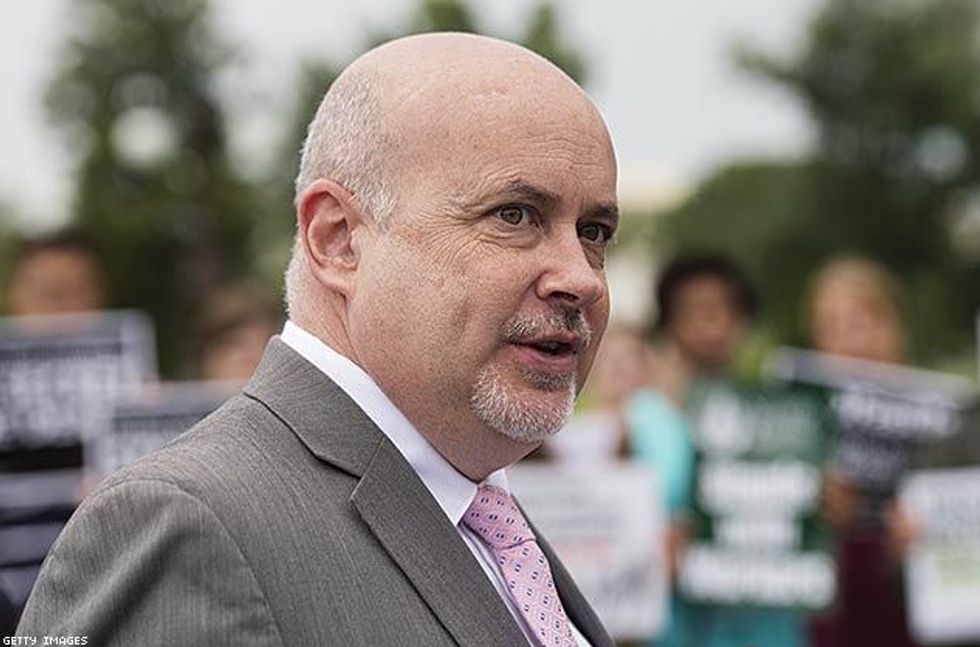
The Gay and Lesbian Victory Fund's mission seems simple enough -- elect more openly LGBT candidates to public office, thereby spreading equality. But many people of late have taken issue with the organization for supporting gay Republican candidates against Democratic challengers who are equally pro-gay. Notably, Michelangelo Signorile penned an op-ed for The Huffington Post titled "Here's Why You Shouldn't Back a Candidate Just Because He's Gay." Signorile shredded the Victory Fund for endorsing an openly gay Republican from Massachusetts, Richard Tisei, who's running against an avowed pro-LGBT progressive, Seth Moulton, to represent the state's 6th Congressional District. The crux of Signorile's argument has merit: A vote for Tisei is a vote for keeping the House of Representatives in GOP hands (what have they done for us lately?), while a vote for Moulton is a vote to return the majority to Democrats (the party that passed hate crimes legislation and repealed "don't ask, don't tell" when last it controlled the chamber).
I get it. I greatly respect Signorile (and agree with his politics 90% of the time), but this scenario requires an alternative perspective. The problem isn't supporting gay Republican candidates over progressive candidates; it's that the Victory Fund doesn't take enough chances on openly LGBT candidates in the places where we most need pro-LGBT voices now: legislatures in the South and some parts of the Midwest, and nearly every Republican caucus in the nation.
The Victory Fund loves to talk about its "win rate," the percentage of candidates it endorses who actually get elected. From 2009 through 2013, it averaged an impressive win rate of 68%. In press releases and quotes, it often refers to this success rate using words like "extraordinary" and "phenomenal." This is obviously great for fundraising -- everyone wants to give to a winner. But here's the flip side of that coin: If you're right that frequently in politics, you're not taking enough risks. Much better for the Victory Fund would be a lower win rate because it got into races earlier and took more chances on candidates who didn't necessarily look like a perfect bet. Those are the candidates whose campaigns can most benefit from the money and who are often running in places where they're pushing the envelope. In other words, they're running in areas of the country that need pro-LGBT voices the most.
At right: Trevor Thomas and campaign supporters
Case in point: Trevor Thomas, who ran for Michigan's 3rd Congressional District in 2012. Thomas should have been a great candidate for the Victory Fund. He was a proven LGBT advocate, a veteran of both the Human Rights Campaign and the Servicemembers Legal Defense Network, where he served as director of communications during the final year of the successful effort to repeal "don't ask, don't tell." He was running in West Michigan, a conservative section of a blue-leaning state that had elected only one openly gay lawmaker in its history -- State Rep. Chris Kolb, who retired in 2007. That may have changed in November (at press time, there were five LGBT candidates running for the state legislature). But Thomas was ahead of the curve. He was also staunchly pro-choice, which is a rarity in socially conservative West Michigan (even for a Democrat), and his position on choice is one of the Victory Fund's four criteria for endorsements.
 Above: Above: Victory Fund-backed candidate Kyrsten Sinema (Ariz.)
Above: Above: Victory Fund-backed candidate Kyrsten Sinema (Ariz.)Yet the Victory Fund did not endorse. Peter Rosenstein analyzed the organization's failure to enter this race in a Washington Blade op-ed, and the decision boiled down to two reasons: (1) Thomas would be fighting an uphill battle in the general election; (2) Thomas wasn't favored by the Democratic Congressional Campaign Committee (DCCC), mostly because his primary opponent, Steve Pestka, could self-fund his campaign. The Democratic establishment mistakenly assumed deep pockets would make Pestka more electable in the general election against the Republican incumbent, Rep. Justin Amash.
I tracked this campaign closely because I knew Thomas and also because the victor would ultimately represent the city I hail from: Grand Rapids, Mich. When Thomas first entered the race, local Dems were asleep at the switch, not even realizing they could win the seat because the area was usually so reliably red. But Thomas realized that Barack Obama's candidacy shook up the district's voting trends in 2008, when Obama narrowly won the district after George W. Bush had taken it by more than 15 points in the two previous election cycles.
Throughout the race, the Victory Fund passed up opportunities to give Thomas a boost. First, they said they would consider endorsing him if he could prove his viability by raising $100,000. Thomas filed his candidacy on Feb. 9, 2012, and surpassed that fund-raising goal just seven weeks later. The following month, Thomas succeeded in making his primary challenger's 2001 vote to defund Planned Parenthood a legitimate campaign issue, and Pestka ultimately changed his position, telling the Battle Creek Enquirer, "I don't believe in making abortion illegal." In June, Democratic pollster Mark Mellman found that Thomas's biggest hurdle to beating Pestka was name recognition. Once voters were briefed on the positions, Thomas held a 22-point lead. Money could have helped with that, but the Victory Fund stayed silent with each passing month.
Thomas also amassed endorsements from serious political players, including former Michigan governor Jennifer Granholm, Rep. Diana DeGette of Colorado, who co-chairs the House's Pro-Choice Caucus, and Rep. Barney Frank of Massachusetts, who said, "I think Trevor is the best Democrat to beat Justin Amash in the fall." Additionally, Thomas earned the support of Planned Parenthood and the progressive veterans group VoteVets.org -- both of which provided significant resources to him in the form of money, mailers, and volunteers. Thomas ultimately amassed a war chest of close to $450,000, between donations made to his campaign and independent expenditures made by outside groups.
Meanwhile, Pestka's game plan amounted to writing personal checks to his own campaign for nearly $600,000, which accounted for about 75% of his total fundraising in the primary. The DCCC was right: Pestka could self-fund. He was also a man with antiquated views who wasn't much interested in campaigning. Pestka won the August primary but was no match for the much younger, more exuberant, and equally deep-pocketed incumbent, who prevailed 53% to 44% in the general election. File that one under "Missed Opportunity."
Thomas needed early money. A Victory Fund endorsement would have put him on the radar of scores of wealthy LGBT donors who use the organization's list as a guide to their own giving. In fact, early money has always been the mantra for one of the most revered political action committees in the business: EMILY's List, which stands for "Early money is like yeast" (it raises dough). The mission of EMILY's List since its founding in 1985 is to "elect pro-choice Democratic women to office." One data-driven analysis of the organization's overall effectiveness published by the American Political Science Association in 2010 found that an EMILY's List endorsement "almost quadruples the likelihood of electoral success" for candidates who seem the least likely to earn an endorsement (e.g. candidates who have less money or who are running in more conservative states). However, the same study found the organization's endorsement had "absolutely no impact" on candidates for whom an endorsement would seem most likely (e.g. those with money running in more progressive areas of the country). In August 2012, EMILY's List sent out a press release celebrating its own 70% win rate during the primary season--because primaries are where the action's at if you're trying to engineer a change in leadership of the country.
The Victory Fund did endorse four potential Democratic newcomers to Congress in 2012: Three of them had high-profile DCCC backing (Mark Takano of California, Sean Patrick Maloney of New York, and Kyrsten Sinema of Arizona) and one of them was an odds-on favorite from the start (Mark Pocan of Wisconsin). Of those four, Sinema was probably the longest shot and she likely benefited most from an early Victory Fund endorsement in February (along with an EMILY's List endorsement in April). But all four candidates won.
 Above: Above: Victory Fund-backed candidate Richard Tisei (Mass.)
Above: Above: Victory Fund-backed candidate Richard Tisei (Mass.)
The other congressional newcomer the Victory Fund endorsed, who did not have DCCC support, was Richard Tisei, the Massachusetts Republican whose 2012 bid failed and who, at the time of this writing, was trying again in November 2014. For a pro-LGBT organization, there's a strategic case to be made for trying to elect more LGBT Republicans. GOP caucuses are where we desperately need pro-equality voices weighing in on the discussion. Right now, there's not a single openly gay voice among the 233 House Republicans. That has certainly not helped the cause of LGBT equality there.
Upon close examination of various progressive movements -- including labor, immigration, reproductive rights, and environmentalism--it is clear that one advantage the LGBT movement has had in moving legislation and accelerating public opinion in our favor has been our ability to occasionally make appeals across party lines. In New York, for instance, we gained the freedom to marry because the Republican senate majority leader, Dean Skelos, both allowed the measure to come to a vote and let his members take a "vote of conscience" on it. Skelos's willingness to let the bill be voted on yielded four Republican "yeas" and a marriage tipping point that doubled the number of Americans living in states with equal marriage rights.
 Above: Victory Fund-backed candidate Mark Pocan (Wis.)
Above: Victory Fund-backed candidate Mark Pocan (Wis.)Strategically speaking, as a movement, we will be more successful if we diversify our support and are less dependent on Democratic control in state legislatures and Congress. In fact, before 2009-2010, the last time Democrats controlled both congressional chambers and the presidency was 1993-1994, and prior to that it was 1977-1980. I'd rather not trim down our shot at equality to one narrow two-year window every 15 years or so.
The places where we most need a fresh crop of equality lawmakers are in the South and the Midwest, regardless of party affiliation. But the chances of finding Republican candidates in those regions who are both openly gay and pro-choice are presently pretty slim. I count myself an advocate for reproductive rights, and yet I see no reason why the Victory Fund should use one's views on abortion as a criterion for one's ability to advocate on behalf of LGBT equality. That essentially rules out Republicans (and even some Democrats) who don't live on the progressive edges of this country. It chokes off viable voices for LGBT equality in the caucuses where we need them most. In fact, all three gay Republican candidates for Congress in 2014 (Tisei, Dan Innis of New Hampshire, and Carl DeMaio of California) are pro-choice and hail from the country's more liberal regions on the West Coast and in the Northeast. While it would help the cause of equality to have an openly gay voice among House Republicans, in the long run it will help the cause more to geographically diversify where those calls for equality are coming from.
The Victory Fund is trying to have it both ways, aiming to be progressive and nonpartisan at the same time, which hamstrings its ability to do either thing really well. EMILY's List, for instance, has a one-line mission statement: "We elect pro-choice Democratic women to office." Very straightforward. The Victory Fund should make an equally decisive choice and either follow the passionate counsel of Signorile by becoming unabashedly progressive or become a truly nonpartisan operation that keeps its options open nationwide. I would argue for the latter--not necessarily so it can support Republicans from places like Massachusetts, but rather so it can foster the candidacies of LGBT moderates and progressives, specifically in the South and the Midwest.
But no matter what side the Victory Fund comes down on, it should take more chances earlier, and in the places that need it most.




 Above: Above: Victory Fund-backed candidate Kyrsten Sinema (Ariz.)
Above: Above: Victory Fund-backed candidate Kyrsten Sinema (Ariz.) Above: Above: Victory Fund-backed candidate Richard Tisei (Mass.)
Above: Above: Victory Fund-backed candidate Richard Tisei (Mass.) Above: Victory Fund-backed candidate Mark Pocan (Wis.)
Above: Victory Fund-backed candidate Mark Pocan (Wis.)

































































Charlie Kirk DID say stoning gay people was the 'perfect law' — and these other heinous quotes